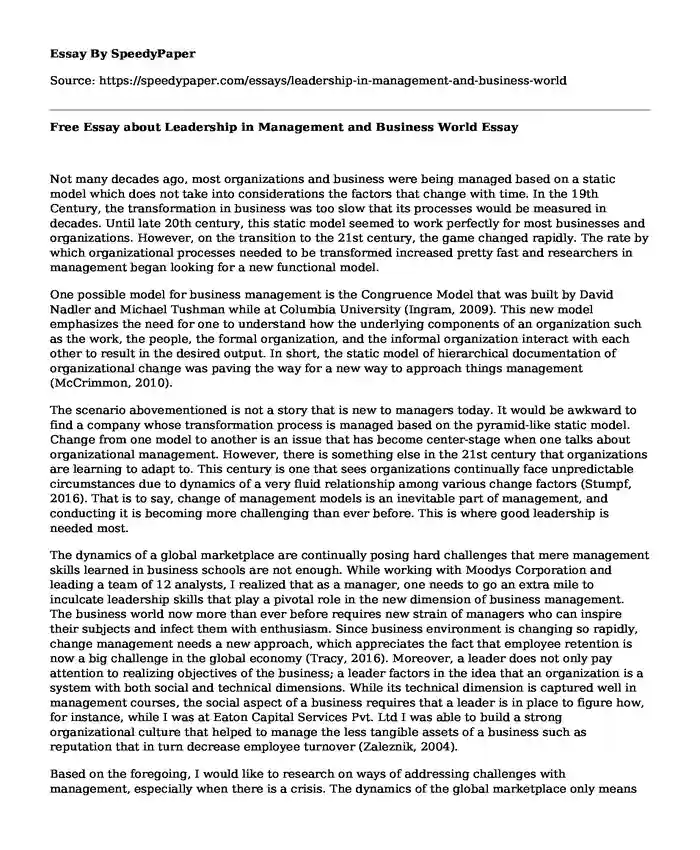
| Type of paper: | Essay |
| Categories: | Leadership analysis Management Business |
| Pages: | 3 |
| Wordcount: | 713 words |
Not many decades ago, most organizations and business were being managed based on a static model which does not take into considerations the factors that change with time. In the 19th Century, the transformation in business was too slow that its processes would be measured in decades. Until late 20th century, this static model seemed to work perfectly for most businesses and organizations. However, on the transition to the 21st century, the game changed rapidly. The rate by which organizational processes needed to be transformed increased pretty fast and researchers in management began looking for a new functional model.
One possible model for business management is the Congruence Model that was built by David Nadler and Michael Tushman while at Columbia University (Ingram, 2009). This new model emphasizes the need for one to understand how the underlying components of an organization such as the work, the people, the formal organization, and the informal organization interact with each other to result in the desired output. In short, the static model of hierarchical documentation of organizational change was paving the way for a new way to approach things management (McCrimmon, 2010).
The scenario abovementioned is not a story that is new to managers today. It would be awkward to find a company whose transformation process is managed based on the pyramid-like static model. Change from one model to another is an issue that has become center-stage when one talks about organizational management. However, there is something else in the 21st century that organizations are learning to adapt to. This century is one that sees organizations continually face unpredictable circumstances due to dynamics of a very fluid relationship among various change factors (Stumpf, 2016). That is to say, change of management models is an inevitable part of management, and conducting it is becoming more challenging than ever before. This is where good leadership is needed most.
The dynamics of a global marketplace are continually posing hard challenges that mere management skills learned in business schools are not enough. While working with Moodys Corporation and leading a team of 12 analysts, I realized that as a manager, one needs to go an extra mile to inculcate leadership skills that play a pivotal role in the new dimension of business management. The business world now more than ever before requires new strain of managers who can inspire their subjects and infect them with enthusiasm. Since business environment is changing so rapidly, change management needs a new approach, which appreciates the fact that employee retention is now a big challenge in the global economy (Tracy, 2016). Moreover, a leader does not only pay attention to realizing objectives of the business; a leader factors in the idea that an organization is a system with both social and technical dimensions. While its technical dimension is captured well in management courses, the social aspect of a business requires that a leader is in place to figure how, for instance, while I was at Eaton Capital Services Pvt. Ltd I was able to build a strong organizational culture that helped to manage the less tangible assets of a business such as reputation that in turn decrease employee turnover (Zaleznik, 2004).
Based on the foregoing, I would like to research on ways of addressing challenges with management, especially when there is a crisis. The dynamics of the global marketplace only means that crises are part of businesses and focusing and building leadership skills to handle them as they arise is hypothetically good turning point for management and business leadership. It would be interesting for me to research this aspect of leadership that has become of age in the new business world.
References
Ingram, D. (2009). The Importance of Leadership in Business. Smallbusiness.chron.com. Retrieved 2 November 2016, from http://smallbusiness.chron.com/importance-leadership-business-3117.html
McCrimmon, M. (2010). A NEW ROLE FOR MANAGEMENT IN TODAYaS POST-INDUSTRIAL ORGANIZATION a. Iveybusinessjournal.com. Retrieved 2 November 2016, from http://iveybusinessjournal.com/publication/a-new-role-for-management-in-todays-post-industrial-organization/
Stumpf, M. (2016). 21st Century Leadership: Redefining Management Education: Educating Managers in the Modern Era. strategy+business. Retrieved 2 November 2016, from http://www.strategy-business.com/article/19405?gko=3b347
Tracy, B. (2016). Management Skills- What Makes a Good Leader, Leadership Qualities. Briantracy.com. Retrieved 2 November 2016, from http://www.briantracy.com/blog/business-success/management-skills-what-makes-a-good-leader/
Zaleznik, A. (2004). Managers and Leaders:A Are They Different?. Harvard Business Review. Retrieved 2 November 2016, from https://hbr.org/2004/01/managers-and-leaders-are-they-different
Cite this page
Free Essay about Leadership in Management and Business World. (2019, Dec 09). Retrieved from https://speedypaper.com/essays/leadership-in-management-and-business-world
Request Removal
If you are the original author of this essay and no longer wish to have it published on the SpeedyPaper website, please click below to request its removal:
- Love Relationship Essay Samples for Everyone
- Landlord Tenant Law - Learn More from Our Free Essay
- Essay Sample on Generational Differences at Workplace
- Reflective Log on Learning Process, Free Essay for You
- Essay Example: Three Important Developments in the Evolution of Canadian Multiculturalism
- Free Essay: Newark HIV/AIDS Needs Assessments Under Ryan White Project
- Free Essay on the Team Works in Organizations
Popular categories




